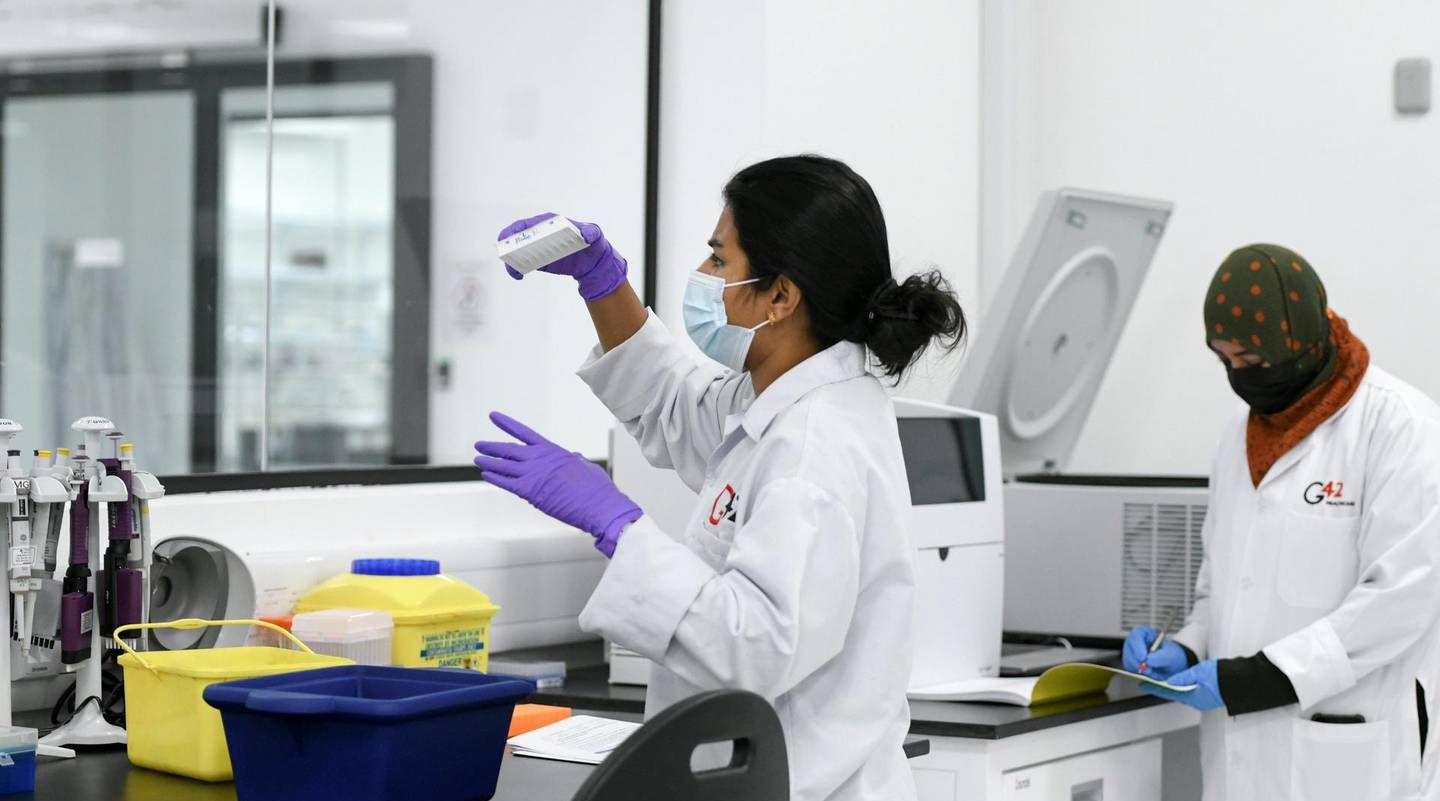The UAE is witnessing a successful recovery from the impact of the COVID-19 pandemic. During the pandemic crisis, the UAE ensured a proactive response with massive testing and vaccination efforts. The country continues to sit in the top three of Bloomberg's monthly global COVID-19 resilience ranking. Furthermore, Expo 2020 Dubai recorded more than 24 million visits in its six months, with one in three visitors coming from countries across the world.
In view of the positive recovery from COVID-19, Abu Dhabi healthcare leaders are working on future projects to strengthen the sector.
In an exclusive interview with The National, Dr Hamed Al Hashemi, digital health lead and adviser to the chairman of the Department of Health-Abu Dhabi and Ashish Koshy, chief executive of G42 Healthcare, a health technology company and subsidiary of artificial intelligence firm Group 42, discussed the future preparedness of the Emirate against any crisis.
In the aftermath of the pandemic crisis, Abu Dhabi has become even stronger with the world's first population-wide genetic library, pioneering connected health and building on previous collaborations with pharmaceutical giants Pfizer and AstraZeneca in medical research.
Data collection for Emirati Genome Programme
Three months before the onset of COVID-19, the DOH launched the Emirati Genome Programme. The national project is aimed at capturing the genomic data of every Emirati in the country. This first-of-its-kind initiative will give citizens access to their own personal genome and incorporate this data into healthcare management.
While the project halted due to COVID-19, Koshy noted that it is now in overdrive. The authorities are looking forward to hiring more than 200 new lab technicians, cloud engineers and artificial intelligence experts, among others this year to its campus in Masdar City. G42 Healthcare's Omics Centre of Excellence has been set up to manage DNA samples, sequence the genetic information and store the data.
The genetics lab will be screening the entire Emirati population of one million within months, following which it will be extended to the UAE's expatriate population of roughly 8.8 million.
The population-wide data set of entire human genomic sequences collected from UAE's diverse communities will be significant for testing drug efficacy and disease prevention.
While the sample collection is currently underway, the next step is to decide who gets access to the data sets and what projects to prioritise among universities, local authorities and larger multinationals, Mr Koshy added.
"What we're trying to solve is potentially working with pharmaceutical companies like AstraZeneca, or Pfizer to bring them into Abu Dhabi, leverage the data set that works on a diverse population, and create something that works for all,” Mr Koshy said.
According to Koshy, the centre will also be used for capturing and analysing genomic sequences that are not human. Eventually, G42 Healthcare will move towards food security with the help of its Omics centre to find traits in plants that will have the potential to boost yields and survive in problems like pests and drought.
The genome project is a major initiative in Abu Dhabi's ambitious plans to achieve personlised medicine along with a connected network of medical records across the emirate.
Today, personalised medicine is being seen as a gateway to overcoming the limitations of traditional medicine, according to the US genomics research lab, The Jackson Laboratory.
In August 2018, the DOH partnered with Injazat Data Systems, owned by Mubadala Investment Company, with the aim of developing a health data exchange system for Abu Dhabi's healthcare sector.
The partnership created the Malaffi system, launched in January 2019. It enables real-time exchange of patient health information between healthcare providers in order to strengthen patient outcomes. As of April 2021, 95 percent of Abu Dhabi hospitals have been connected to Malaffi.
“If you have data, we better use it for saving lives or improving the efficiency of the system,” Dr Al Hashemi said of the department's philosophy on data collection.
Currently, DoH is working on boosting the capabilities of Malaffi. Until now, it has used the data available on the system to develop predictive algorithms for 14 different diseases to provide an early warning system to physicians in case of a predisposition in a patient.
Dr Al Hashemi added that the clinical data will further be integrated with the genomics project.
Koshy noted that this milestone will mark "the doorway to personalised medicine” in the emirate.
Telehealth advancement
Telemedicine is also being developed to allow doctors to treat patients without the need for a physical visit.
“The current industry trends suggest patients suffering from chronic diseases that require routine hospital visits are now being encouraged to stay at home and consult doctors and monitor symptoms with the help of technology,” Mr Koshy underlined.
As per experts, telemedicine and wearables work hand in hand to work as early warning systems of our bodies.
Experts are working on ensuring continuous monitoring of patients through wearable devices to facilitate a more hybrid model of care with the help of telehealth measures.
“We're meeting technology companies every month that want to participate in this area. It's time to extend the elements of telehealth," Dr Al Hashemy added.
Dr Al Hashemy and Mr Koshy expressed their excitement about various prospects of strengthening the health sector and making Abu Dhabi a destination of choice for clinical trials and collaborative healthcare research.
Last year, G42 Healthcare launched Insights Research Organisation and Solutions. This first-of-its-kind contract research organisation is aimed at supporting internationally leading standards of scientific and ethical research, conduct clinical trials and report and develop treatments. The organisation was established after Phase III clinical trials for the development and testing of a COVID-19 vaccine achieved success in the UAE. The trials saw the participation of more than 100 nationalities.
"It was the most diverse clinical trial. And I think that is exactly what pharma companies want — to come in and look into: how do we get access to a diverse population under one single roof," Mr Koshy said.
SOURCE: The National News
 AR
AR UR
UR
